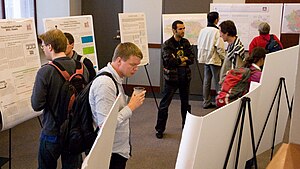The International Symposium on Graph Drawing (GD) is an annual academic conference in which researchers present peer reviewed papers on graph drawing, information visualization of network information, geometric graph theory, and related topics.

Significance
editThe Graph Drawing symposia have been central to the growth and development of graph drawing as a research area: as Herman et al. write, "the Graph Drawing community grew around the yearly Symposia."[1] Nguyen[2] lists Graph Drawing as one of "several good conferences which directly or indirectly concern with information visualization", and Wong et al.[3] report that its proceedings "provide a wealth of information". In a 2003 study the symposium was among the top 30% of computer science research publication venues, ranked by impact factor.[4]
History
editThe first symposium was held in Marino, near Rome, Italy, in 1992, organized by Giuseppe Di Battista, Peter Eades, Pierre Rosenstiehl, and Roberto Tamassia. The first two symposia did not publish proceedings, but reports are available online.[5] Since 1994, the proceedings of the symposia have been published by Springer-Verlag's Lecture Notes in Computer Science series.[6]
Countries in which the conference has been held include Australia, Austria, Canada, the Czech Republic, France, Germany (twice), Greece, Ireland, Italy (three times), and the United States (five times).
Citation data and its analysis
editA citation graph having vertices representing the papers in the 1994–2000 Graph Drawing symposia and having edges representing citations between these papers was made available as part of the graph drawing contest associated with the 2001 symposium.[7] The largest connected component of this graph consists of 249 vertices and 642 edges; clustering analysis reveals several prominent subtopics within graph drawing that are more tightly connected, including three-dimensional graph drawing and orthogonal graph drawing.[8]
See also
edit- The list of computer science conferences contains other academic conferences in computer science.
References
edit- ^ Herman, Ivan; Melançon, Guy; Marshall, M. Scott (2000), "Graph visualization and navigation in information visualization: A survey", IEEE Transactions on Information Visualization and Computer Graphics, 6 (1): 24–43, doi:10.1109/2945.841119, S2CID 239537[permanent dead link].
- ^ Nguyen, Quang Ving (2005), Space-Efficient Visualization of Large Hierarchies, Ph.D. thesis, Univ. of Technology, Sydney, hdl:2100/315.
- ^ Wong, Pak Chung; Chin, G.; Foote, H.; Mackey, P.; Thomas, J. (2006), "Have Green – A Visual Analytics Framework for Large Semantic Graphs", IEEE Symposium On Visual Analytics Science And Technology (PDF), pp. 67–74, doi:10.1109/VAST.2006.261432, S2CID 16477177, archived from the original (PDF) on 2011-07-20, retrieved 2011-03-03.
- ^ Estimated impact of publication venues in Computer Science, CiteSeer, May 2003.
- ^ Report from 1992 symposium Archived 2016-09-27 at the Wayback Machine and 1993 symposium Archived 2016-09-27 at the Wayback Machine.
- ^ Listing of GD conference proceedings in DBLP.
- ^ Biedl, T. C.; Brandenburg, F. J. (2002), "Graph-drawing contest report", Graph Drawing, 9th Int. Symp., GD 2001, Lecture Notes in Computer Science, vol. 2265, Springer-Verlag, pp. 513–522.
- ^ Brandes, U.; Willhalm, T. (2002), "Visualization of bibliographic networks with a reshaped landscape metaphor", Proc. Symp. Data Visualisation 2002, Eurographics Association, pp. 159–164, ISBN 9781581135367.
External links
edit- Official website
- the DBLP entry (with list of articles).